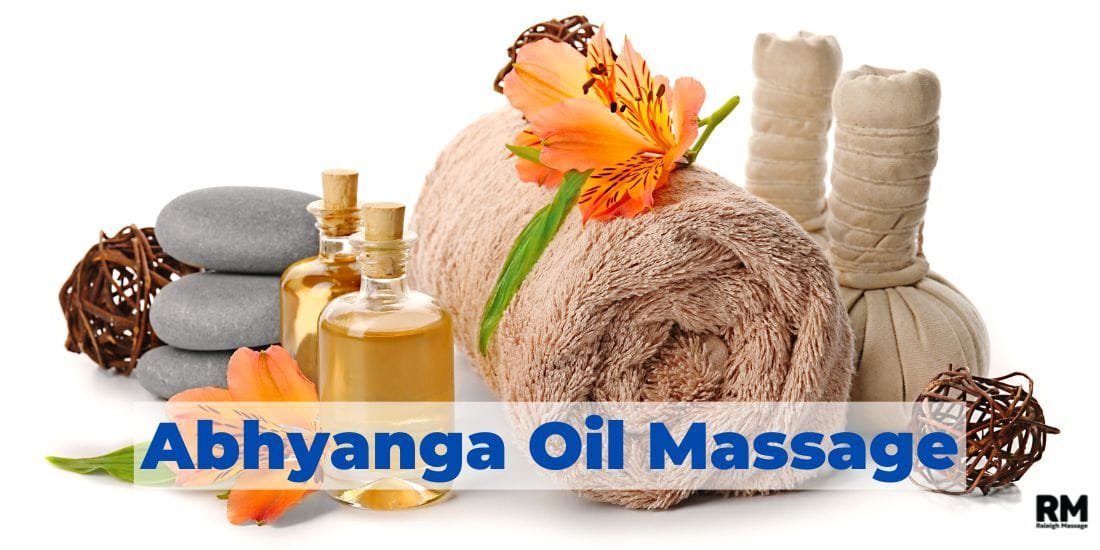Have you heard of abhyanga massage? If not, you are in for a treat. Abhyanga massage is an ancient Ayurvedic massage in India that provides in-depth benefits to our body and mind. It is also often referred to as warm oil massage because of the warm, nourishing oils used in this type of massage. This kind of massage is not only relaxing; it’s also profoundly healing. You may be asking yourself,
What is abhyanga massage, anyway?
No, it’s not your everyday Swedish or deep-tissue massage. This is a comprehensive massage where warm oil is applied generously and massaged into your skin rhythmically. Yoga is an ancient practice that began in India thousands of years ago. The type of massage is called Abhyanga, which is meant to balance your doshas (the energies in your body), calm your mind, and restore your whole self.
Whether you’re stressed out, feeling worn down, or just want to treat yourself, abhyanga massage can be a useful antidote. Read on, and I’ll break down its benefits, side effects, and how this warm oil massage is unlike any other.
Abhyanga Massage Benefits
You probably think about what you stand to gain before trying something new if you are anything like me. Here’s a laundry list of reasons why it’s worth trying out the abhyanga massage. Here’s what I’ve learned about its perks:
- Improved Circulation
What immediately follows after finishing the abhyanga massage is improved blood flow. The warm oil in combination with massage movements will have enhanced circulation in your body. It leaves you feeling fresh and energized.
- Relaxes Stress and Anxiety
Most of the time we are exposed to hectic schedules, hence stress becomes part and parcel of our lives without our realization. Abhyanga massage acts as a reboot to the nervous system whereby the rhythmic strokes along with the warm oil in contact with the skin bring calmness to the entire body thereby easing the tension away.
- Skin Health
The oils in abhyanga are not just any oils; they’ve usually been infused with a collection of specific body appropriate herbs. This feeds your skin leaving it soft, hydrated, and glowing.
- Detoxification
In case you haven’t known so far, abhyanga massage helps the body expel toxins. It backs detox by activating the lymphatic system; thus, one feels light and healthy.
- Improves Sleep Quality
Abhyanga could be the answer to sleepless nights if sleep eludes you. This warm oil massage can help you relax and sleep better.
- Alleviates Joint and Muscle Pain
Some days I have felt a bit stiff and achy in my back and shoulders. On such days, warm oil of abhyanga has been most refreshing, melting away the stiffness, bringing relief in overworked and complaining muscles and joints.
These will vary with the individual, but so far, I have not yet met anyone who did not derive at least some benefit from abhyanga massage.
Side Effects of Abhyanga Massage
You’ve got to be thinking now That sounds great, but what are its side effects? Quite a pertinent question, and I’ll be very honest with you since abhyanga massage is in general safe, few precautions are worth mentioning.
- Sensitive Skin or Allergic to Ingredients
For those who have sensitive skin, the oils applied can provoke irritation. Do talk to your massage therapist about any allergies you may have. Well, the good news is there are quite a number of oil choices to make it work for you.
- Overstimulation
Long and short of it is that as unbelievable as it might sound, some people find abhyanga too relaxing. You may feel extremely sleepy or sluggish after the session. All refreshing and sleeping post-session only presents this to go away.
- Not Best for Certain Conditions
Whether you are pregnant, running a high fever, or have some medical condition, specifically, it’s advisable to consult with the doctor first. Abhyanga may not be suitable for all.
- Temporarily Detox Symptoms
Due to the detoxifying effect of the warm oil massage, a few people feel slightly tired or experience mild headaches soon after the first session. However, they pass off quickly.
The side effects are, on the whole, insignificant. If you talk with your therapist and heed his advice, chances are that you are going to have a positive experience.
Abhyanga Oil Massage
Now, here’s where things get really interesting. Not all massages involve oil, but with abhyanga, the oil is the star of the show. Every detail—from the type of oil to its temperature—is carefully chosen to enhance the experience.
Why Warm Oil?
Warming the oil allows it to penetrate the skin more effectively and provides a soothing effect. Feel the warmth surrounding your body; it’s comforting. It’s like being swaddled in a cozy, warming blanket.
Types of Oils
The main one is the oil you use; it all depends on what your body needs. Popular oils include sesame, coconut, almond, and herbal blends infused with Ayurvedic components. Different oils have different properties. For example, sesame oil is grounding; coconut oil is cooling.
When I first tried abhyanga, I was stunned by how customized it felt. They explained why they selected a particular oil, for example, and then customized the massage pressure to how I felt at any given moment.
What to Expect
During abhyanga, the therapist uses copious amounts of oil and applies it all over your body. The strokes are often long, flowing, and in unison. It seems deliberate, as if choreography. Your skin absorbs the oil deeply, promoting health and kindness.
Bonus tip? Plan for some downtime after your massage, as well. You will want to chill and enjoy the benefits.
How Much Does Abhyanga Massage Cost?
As for the abhyanga massage price, it usually varies depending on your location. I have found the price to be typically between $80 and $150 there- it can be lower or higher. Just look up “abhyanga massage near me” to know what the price is in your area. Believe me, it’s worth every dollar for the relaxation and healing it gives.
Most abhyanga massages are priced a bit on the higher end, attributed to the use of good quality oil and experienced therapists, hence something to keep in mind when budgeting. If you do find someone offering this service, read reviews or ask around to make sure you are getting the real thing.
Why Should You Try Abhyanga Massage?
If you’re still in two minds, consider this. When was the last chance you took to do something just for yourself? Abhyanga massage is like a warm embrace for your body and your spirit to reconnect with yourself; hence, restoring balance within you, not to mention the health benefits that transcend mere indulgence.
Even once in a lifetime, I say go for it. We have such a short life, and we need time to enjoy some peace and self-care. First session, and truly I felt it was a different “me” altogether. Wish you luck with that.
Feeling inspired to try abhyanga massage? Check out Raleigh Massage for an incredible experience. You can learn more and book a session.
Frequently Asked Questions (FAQs)
1. How frequently must I get a abhyanga massage?
You can do this daily ideally, but once a week or once a month also does miracles.
2. Can you perform abhyanga massage at home?
Yes, you can! Heat some oil, and make slow, long strokes over your body.
3. Do the different body types require specific types of oils?
Yes, the Ayurvedic oils are dosha based. For example, sesame oil is soothing, whereas coconut oil is cooling.
4. How long does an abhyanga treatment last?
Typically sessions are about 60-90 minutes. Longer sessions may allow for extra procedures.
5. Who should avoid abhyanga massage?
It is generally not harmful but should be avoided in cases of illness, trauma, or pregnancy, unless a doctor knows of your use.









